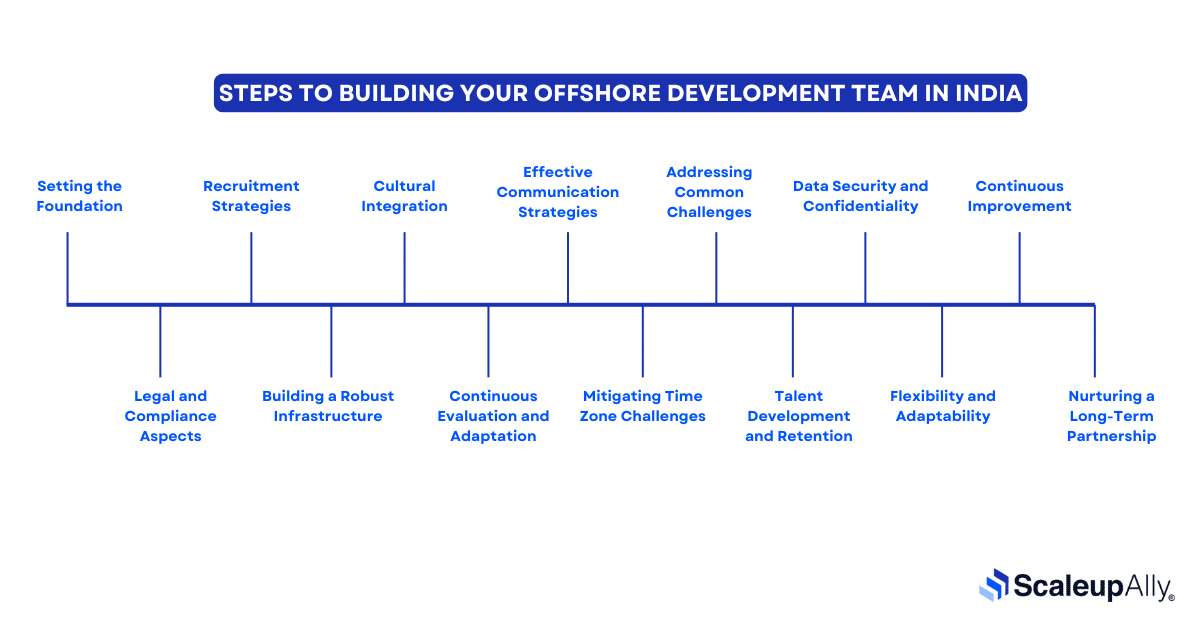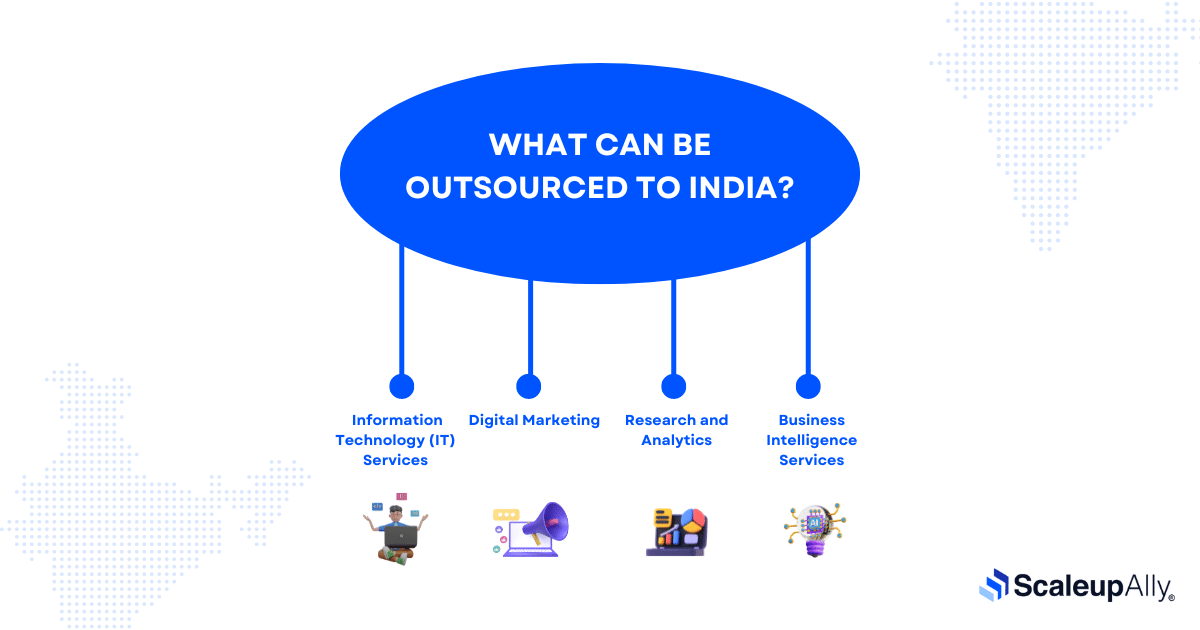
How to build your own offshore development team in India?
Pranay Agrawal | September 29, 2024 , 15 min read
Table Of Content
While technological advancements can seem daunting, specialized software solves many business challenges. It helps streamline workflows, automate processes, improve outcomes, and reduce costs.
However, obtaining high-quality, custom software can be challenging. It is often costly, especially due to the high demand for skilled developers in countries like the US. This demand can lead to long wait times and rushed projects with subpar results.
Despite these challenges, there are ways to address them. One option is to consider offshore development in India. India’s booming software development industry offers cost-effective solutions, faster delivery times, and improved business outcomes.
This article will explore what offshore development in India entails, the benefits of outsourcing to India, and important considerations when working to build an offshore development team in India.
Key Takeaways
- Define your project goals and required skill set before assembling your offshore development team in India.
- Diligently maintain compliance with India’s labour laws, tax regulations, and legal requirements.
- Take the help of trusted agencies and professional networks to find the best talent for your offshore team.
- Invest in communication tools for seamless collaboration and handle time-zone differences.
- Regularly evaluate team performance and adapt processes to align with evolving project goals.
- Commonly outsourced services to India include software development, web/mobile app development, IT support among others.
Why is India Good For Offshoring?
- Why is India Good For Offshoring?
- Steps to Building Your Offshore Development Team in India
- What Can be Outsourced to India?
- 5 Advantages of Setting up an Offshore Development Team in India
- How To Choose The Right Partner for Setting up an Offshore Team in India?
- Choose ScaleupAlly as Your go-to Offshore Development Team
- Conclusion
- Frequently Asked Questions
India’s prominence in the IT industry is indisputable. Renowned for its pool of highly skilled and English-proficient professionals, India has emerged as a global IT hub. Cost-effectiveness, a robust technology infrastructure, and a time zone advantage for Western countries make it an ideal location to establish an offshore team.
- Huge Talent Pool: The highest population of around 4,500,000 with skills in high end developing tech as compared to all other countries makes it more appealing in terms of cost arbitrage and quality of work. This also allows businesses to easily scale their business processes, as the talent is in abundance.
- Negligible Language Barrier: The other added benefit is good acquaintance with English for easy communication. This makes it easier for the companies to have clear communication about the vision and needs, enabling regular updates as a result.
- Welcoming Atitudes: Another one is the humble nature of the Indian population, creates a favourable environment to engage in.
- Time Zone: India is geographically placed in a time zone where it covers various countries, saving time from unnecessary time lags.
- Stable Government: As world largest democracy, with regular elections, stable government, and vibrant culture, all makes India a thriving place to be partnering with.
What do stats say?
- According to the Reserve Bank of India, India’s IT and IT services export value has touched the 199 Bn USD market.
- India is growing its foothold in the offshoring industry, with a good reputation, India exports market size of its offshoring services is around US$190 billion.
- According to Knight Frank’s survey, India leased 46% of its office space capacity to the offshoring industry, a jump of 26% from the previous year.
- Around 1.3 Million engineers graduate every year in India, that is way more than many countries combined.
- 129 Million can speak English, making them one tenth of the global anglophone population.
Steps to Building Your Offshore Development Team in India
Building and overseeing a development team in India that works remotely requires a thoughtful and comprehensive plan. Here are the steps to build an offshore team in India:

1. Setting the Foundation
Before you start assembling a team for offshore development, it’s important to outline your goals and needs clearly. Figure out the exact skills your project requires and define what needs to be done. This clear understanding will make it easier to find the right people and ensure your offshore team in India is set up for success.
2. Legal and Compliance Aspects
Knowing the legal rules and requirements is extremely important when establishing a team in another country. Take the time to learn about India’s labor laws, tax rules, and any other regulations that apply to your business. Doing this doesn’t just make the setup process easier, but it also helps you avoid legal problems later on.
3. Recruitment Strategies
India has a lot of talented people, but it’s important to recruit effectively to find the best match for your team. Work with trusted recruitment agencies, check online job websites, and tap into professional networks. By conducting thorough interviews and skill tests, you can bring people who meet your project’s needs on board.
4. Building a Robust Infrastructure
Communication is the backbone of successful offshore collaborations. Invest in technology infrastructure that facilitates seamless communication and collaboration. Video conferencing tools, project management platforms, and secure data-sharing systems are essential for bridging geographical gaps.
5. Cultural Integration
Cultural alignment is often underestimated but plays a role in the success of offshore teams. Bridge the cultural gap through team-building activities, regular virtual meetings, and fostering an inclusive work environment. A unified team spirit enhances collaboration and productivity.
6. Continuous Evaluation and Adaptation
Implement a continuous evaluation system, seeking feedback from both onshore and offshore teams. This iterative approach allows for timely adaptations, ensuring your offshore team remains aligned with evolving project goals.
7. Effective Communication Strategies
Effective communication is vital for remote teams’ success, especially when working offshore. Use various communication tools like video calls, messaging apps, and project management platforms. Set up regular updates to keep everyone informed and aligned.
8. Mitigating Time Zone Challenges
While the time zone advantage can be beneficial, it also presents challenges. Establish overlapping working hours for seamless collaboration. Communicate expectations regarding response times and project timelines to mitigate potential delays caused by time zone differences.
9. Addressing Common Challenges
Every venture comes with its own set of challenges. Anticipate and proactively address common issues such as cultural misalignment, potential language barriers, and differences in work methodologies. Establishing conflict resolution mechanisms contributes to a harmonious working environment.
10. Talent Development and Retention
Investing in the continuous development of your offshore team not only enhances their skills but also fosters loyalty. Provide training opportunities, mentorship programs, and a clear career growth path. Recognize and reward exceptional performance to boost morale and promote retention.
11. Data Security and Confidentiality
Ensuring the security of your intellectual property and sensitive data is non-negotiable. Implement stringent security protocols, including secure data transmission and storage practices. Communicate and enforce data security policies to instill confidence in your clients and team members.
12. Flexibility and Adaptability
Be open to adapting your strategies based on feedback and changing circumstances. This could include adjusting team structures, refining processes, or exploring new technologies to optimize efficiency.
13. Continuous Improvement
Reflection is a powerful tool for improvement. Regularly evaluate the performance of your offshore team, seeking feedback from clients and team members. Use these insights to refine processes, address pain points, and enhance collaboration.
14. Nurturing a Long-Term Partnership
Creating an offshore development team isn’t just a temporary plan; it’s a long-term investment in a partnership. Develop strong relationships, build trust, and consider visiting your offshore team to strengthen personal connections.
What Can be Outsourced to India?
The country’s skilled workforce, cost-effectiveness, and proficiency in English make it an attractive destination for outsourcing or even setting up an offshore development center.
Here are some key areas that businesses commonly outsource to build dedicated offshore team in India:

1. Information Technology (IT) Services:
- Software Development
- Web Development
- Mobile App Development
- Quality Assurance and Testing
- IT Support and Maintenance
2. Digital Marketing:
- Search Engine Optimization (SEO)
- Social Media Management
- Content Marketing
- Pay-Per-Click (PPC) Advertising
3. Research and Analytics:
- Market Research
- Data Analysis
- Business Intelligence
4. Business Intelligence Services
- BI Reporting
- BI Consulting
- BI Implementation
5. Power BI & Tableau Facilitation
- Data Integration
- Visualization Design
- Data Cleansing
- Visualization Design
- Data Warehousing
- Custom Reporting
- Data Modeling
- BI Tool Integration
- Data Transformation
5 Advantages of Setting up an Offshore Development Team in India
Setting up a dedicated offshore development team in India offers businesses a strategic advantage by combining cost efficiency, skilled talent, and a thriving tech ecosystem. Here are five key benefits of working with offshore teams in India.
1. Skilled Workforce and Scalability
In a study by Statista, India scored highest in People Skills and Availability scorecard with 2.18, firmly establishing it as a skilled powerhouse. It also revealed that Indian developer’s hourly rates are as low as 20 USD to 40 USD.
Since, India surpassed China in terms of population, and is one the youngest countries in the world, with 65% of the population is under the age of 35 years, and around 37.4 million enrolled in higher education like technology, innovation, engineering, core sciences, business, commerce etc.
Around 1.3 million engineers graduate every year. The country has a strong global reputation for excellence in fields like data engineering, analytics, financial services, software development, etc.
2. Cost Arbitrage
One of the most compelling reasons to build your offshore team in India is the significant cost savings. India offers highly competitive pricing for services, mainly due to the lower cost of living compared to Western countries.
This allows companies to access high-quality services at a fraction of the cost they would incur in their home countries. For example, offshoring teams for software development or customer support to India can result in savings of 50-60%.
Additionally, many Indian offshoring team providers offer flexible pricing models, such as fixed-cost or hourly rates, further improving cost management for businesses.
3. Quality and Reliability
Indian offshoring teams have built a reputation for delivering high-quality services. Many of them are certified under global standards such as ISO and CMMI, guaranteeing consistent delivery of top-notch services.
Over the years, India’s offshoring industry has evolved to be more professionally sound, with increased focus on quality.
Companies setting up their offshoring teams in India can expect a strong adherence to deadlines, service-level agreements (SLAs), and excellent quality control measures.
4. Time Zone Advantage
India’s geographical placement offers another strategic benefit, that is a viable time zone, especially for businesses eyeingto set up an offshore team in India from US, Europe, or other regions.
India is typically 9 to 12 hours ahead of these countries, allowing for round-the-clock operations.
This advantage allows businesses to have their tasks completed overnight, accelerating project timelines. Also critical functions like customer support or technical maintenance are available 24/7.
5. .Technological Expertise
India’s technological ecosystem is well-developed, with strong expertise in IT, software development, data analytics, and emerging technologies like artificial intelligence, machine learning, and blockchain.
The country is home to numerous IT hubs, such as Noida, Bangalore, Hyderabad, and Pune, which host global leaders in technology.
With robust digital infrastructure, and ever churning entrepreneurial wheel, India is a hot spot for techies around the world.
How To Choose The Right Partner for Setting up an Offshore Team in India?
Lets now explore how to identify the right partner to build an offshore team in India:
1. Define your requirements and Budget
Clearly outline each and every aspect of your expectations and requirements. Make detailed budgetary estimates within which you are wanting to complete your project. This also includes roles and responsibilities for the offshoring team you are looking for.
2. Thorough Partner Research
Conduct your in depth research on their track record, client testimonials, industry expertise, and certifications. Also, verify their experience with similar projects, scalability, and most importantly have some knowledge of their financial stability. Verify their capabilities, reliability via reference checks and case studies.
3. Clear and Detailed Contracts
Once you are clear of what you are expecting, draft a very clear and detailed engagement contract about the scope of work, deliverables, expected timeline, KPIs, clauses for any changes during the course of the engagement, terms of confidentiality, IP rights, etc. Also establish dispute resolution mechanisms and other terms & conditions to prevent any unforeseen issues.
4. Regular Updates and Communication
Establish a regular communication schedule to track project progress and address any issues promptly. Use various tools like video conferencing, project management software, and regular status reports to maintain transparency. This has been discussed in detail in the above section.
5. Cultural Sensitivity
Since India is a multicultural country, one may find diverse cultural imprints. Almost 1721 languages are spoken here, and hence to outsource work to India demands the understanding and respect of cultural differences for a positive working relationship. This also reflects the Indian population’s ability to accommodate different cultures and to be able to maintain harmony.
6. Risk Assessment & Data Security
Study the country’s laws and regulations regarding intellectual property and other related rights, how the judiciary resolves such issues if it arises. Know about the data security protocols and security measurements for the technologies. Make sure that your chosen partner abides by global data protection standards and cybersecurity.
Choose ScaleupAlly as Your go-to Offshore Development Team
Creating an offshore team can be tough and requires patience. Selecting team members who share your enthusiasm for work is important to avoid future problems.
ScaleupAlly is experienced in supporting your offshoring requirements. We are a trusted offshore development company in India that specialize in overseeing skilled global teams and bringing top talent into various organizations since our inception.
With locations in Australia and India, ScaleupAlly has a talented pool of professionals to offer a productive workforce that meets your business goals.
Get in touch with ScaleupAlly today to assemble a successful IT offshore team for your company.
Conclusion
An offshore software development center saves you from the hassle of setting up your infrastructure, managing a team, overseeing resources, and handling administrative, legal, financial, and other expenses. Moreover, it gives you access to global expertise, enabling you to create custom software for your business at an affordable price. Let’s get in touch if you are still considering hiring an offshore development center for your next project!
Frequently Asked Questions
Q: How do I handle differences in work methodologies between onshore and offshore teams?
Establish clear project management methodologies and workflows. Conduct training sessions to familiarize both teams with each other’s working styles and encourage a collaborative approach.
Q: Can I visit the offshore development team in India during the project?
You can plan visits to your offshore team’s location in India. In-person interactions can strengthen relationships and provide a deeper understanding of the working environment.
Q: How can I ensure the quality of work from the offshore development team?
Implement a quality assurance process. Regularly review deliverables, conduct thorough testing, and provide constructive feedback. This ensures that the offshore team maintains high-quality standards.
Q: Are there any government incentives for outsourcing to India?
India offers various incentives and tax benefits to encourage outsourcing. Research government policies and engage with local authorities to explore available incentives.
Q: How much does offshoring cost in India?
The cost for an offshoring team in India may vary depending on the location, skills, and type of services. In general, the range is as economical as US$20 to US$60 per hour for a single professional. If the engagement requires more than one professional, then the cost may go upto US$ 150 per hour. For a clearer perspective, use our offshore development cost calculator that will help you plan your budget more accurately.
Q: How can I effectively manage an offshore team?
Utilize available tools in the market, like Jira, Asana or Basecamp for tracking the work, keep the communication clear and unified, use tools like Slack and Emails to stay connected & updated. Frequent scheduled check-ins can be effective in dealing with coordination with the offshore team. Agile methodology and flexibility would provide the right support for the overall management of the offshore team.
References:
Related Blogs

Nearshoring vs. Offshoring vs. Onshoring: Key Differences
Discover the key differences between nearshoring, offshoring, and onshoring. Learn the benefits, challenges, and how to choose the best outsourcing strategy for your business.
webadmin
Feb 13 ,
6 min read

Top 20 Emerging Technologies of 2026
Discover the top 20 emerging technologies of 2026. Explore which innovations are driving change across healthcare, finance, manufacturing, and other crucial industries.
ScaleupAlly Team
Dec 16 ,
9 min read

IT Outsourcing Costs Explained: Global Rates, Key Influencers & Cost-Saving Tips
Discover what IT outsourcing costs include, key pricing factors, hidden fees, regional rates, and how to pick a cost-effective outsourcing partner.
Pranay Agrawal
Nov 29 ,
13 min read



